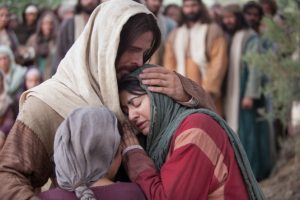Tragedy and even evil seem to be all around us these days. If natural disasters weren’t enough, mass killings are becoming more frequent. I’ve seen a very disturbing trend. Some people are blaming God. Others are publicly persecuting those who pray during or after a disaster. The common thread seems to be, “Wise up. If there were a God, He wouldn’t let this stuff happen.” So, is there a God? If so, why doesn’t He save us from natural disasters? Why doesn’t He stop the evil people in the world from doing harm to others? Bad things happen to good people. Why?
Those who are critical of others for praying to a God who allows such things to happen are missing the mark. They don’t understand why we are here on the earth. How do we grow and progress unless we have adversity in our lives? Heavenly Father loves us enough to allow us to grow from disaster and to have agency.
 It must be incredibly hard for Him to watch us commit such terrible acts against each other—yet, He allows it. Even God will not take away our right to choose between good and evil. If He were to do that, what would be the point of our earthly existence? We would not learn anything. We would have no eternal progression.
It must be incredibly hard for Him to watch us commit such terrible acts against each other—yet, He allows it. Even God will not take away our right to choose between good and evil. If He were to do that, what would be the point of our earthly existence? We would not learn anything. We would have no eternal progression.
There is not a soul who has ever lived, is living now, or who will ever live in the future who will be without trials, afflictions, crosses to bear, and adversity to endure. We were reminded in the October 2016 General Conference of the many trials of the Apostle Paul.
The Apostle Paul, himself no stranger to affliction, drew from his own experience to teach with depth and beauty the eternal perspective that comes when we endure well and with patience. He said, “For our light affliction, which is but for a moment, worketh for us a far more exceeding and eternal weight of glory.” In other words, we can know in the midst of our afflictions that God has provided an eternal compensating reward.
Paul’s ability to speak of the trials, persecutions, and sorrows of his life as “light” afflictions belies the severity of his suffering, which was for him swallowed up by the eternal perspective of the gospel. Paul’s faith in Jesus Christ made all things bearable. Five times he was beaten with stripes, thrice with rods; once he was stoned; thrice he suffered shipwreck; often he was put in peril of death by drowning, by robbers, and even by false brethren; he suffered weariness and pain, hunger and thirst, and was imprisoned in the cold and in nakedness.
Many of us have pleaded with God to remove the cause of our suffering, and when the relief we seek has not come, we have been tempted to think He is not listening. I testify that, even in those moments, He hears our prayers, has a reason for allowing our afflictions to continue, and will help us bear them (Elder Evan A. Schmutz, Of the Seventy, “God Shall Wipe Away All Tears,” Oct. 2016 General Conference).
The natural disasters and manmade atrocities that we witness on the news are a sign of the times. We are in the last days. This should not be a surprise. Prophets and apostles have prophesied about this for a very long time. We know how this will end. There will be no surprise ending. God has this in hand. There is an eternal plan. It is our job to have faith and endure to the end.
One of the ways Satan wants us to manipulate others is by dwelling upon and even exaggerating the evil in the world. … Certainly, our world has always been and will continue to be, imperfect. Far too many innocent people suffer because of circumstances of nature as well as from man’s inhumanity. The corruption and wickedness in our day are unique and alarming. …
[W]e are blessed to have the fullness of the gospel of Jesus Christ, which gives us a unique perspective on the world’s dangers and shows us how to either avoid these dangers or deal with them. … As His covenant people, we need not be paralyzed by fear because bad things might happen. Instead, we can move forward with faith, courage, determination, and trust in God as we approach the challenges and opportunities ahead (President Dieter F. Uchtdorf, “Perfect Love Casteth Out Fear,” Apr. 2017 General Conference).
 Over and over again prophets have told us we have no reason to fear, and that we should live joyful lives. We think that is so hard, but it really isn’t. It is a matter of faith. We have the power to do hard things.
Over and over again prophets have told us we have no reason to fear, and that we should live joyful lives. We think that is so hard, but it really isn’t. It is a matter of faith. We have the power to do hard things.
Hard is part of the gospel plan. One of the purposes of this life is for us to be proven (see Abraham 3:25). … [H]ard is the constant! We all have challenges. The variable is our reaction to the hard. … [H]ard can be good for those who will move forward with faith and trust the Lord and His plan (Elder Stanley G. Ellis, Emeritus Member of the Seventy, “Do We Trust Him? Hard Is Good,” Oct. 2017 General Conference).
Maybe the hardest thing for all of us is to trust in the Plan of Salvation that we all voted for in the council in the preexistence. When we doubt Heavenly Father’s plan, we doubt Christ, and we doubt ourselves. We agreed with this plan in the beginning. We had faith then that it would work. All that is left is for us to continue in the same faith we had in the preexistence. We should be joyful that we are here. We’ve been given incredible promises for the eternities. All we have to do is be obedient in following Christ, and endure to the end. That, to me, is a good reason to be joyful.
To all those who publicly mock believers who pray, I would say this: Be very careful, for God will not be mocked. Those who persecute others will receive the consequences for their actions just as quickly as those who follow Christ will reap their rewards in heaven.
Yes, bad things do happen to good people. They always have, and they will until the end of time as we know it. It is how we react to those bad things that count. Do we throw a temper tantrum against God, or do we rejoice in the knowledge of the Plan of Salvation?
As we pick up the pieces of broken lives from natural disasters and from man’s inhumanity to man, let’s have an attitude of gratitude for all that God has bestowed upon us. Let’s also be grateful for the many good people who have sacrificed so much to help us put lives back together.
Those people quite often don’t receive the praise of man—through media, or any other way. They quietly go about serving as Christ served. Look carefully, and you will see that there is still much good in the world. We have many things to be grateful for, and many reasons to rejoice and live joyful lives. Remember who you are; for you are literally a child of God.
About Tudie Rose
Tudie Rose is a mother of four and grandmother of ten in Sacramento, California. You can find her on Twitter as @TudieRose. She blogs as Tudie Rose at http://potrackrose.wordpress.com. She has written articles for Familius. You will find a Tudie Rose essay in Lessons from My Parents, Michele Robbins, Familius 2013, at http://www.familius.com/lessons-from-my-parents.
Twitter •








as JEFF’S dad he amazes me.life has given him some caustic food to swallow. any father would be proud to have him. we have loved each other 50+yrs. however iamthebetter looking one. oh well.he got the perfect family